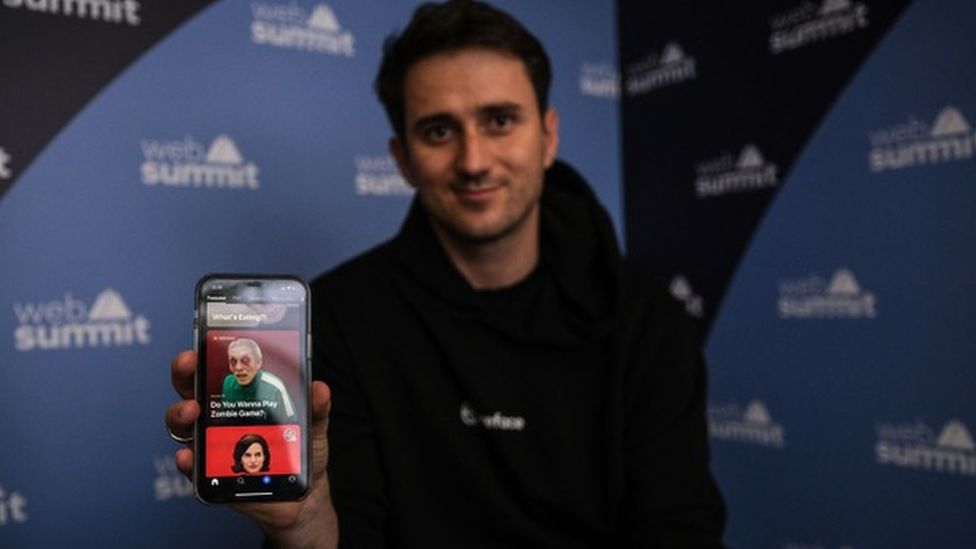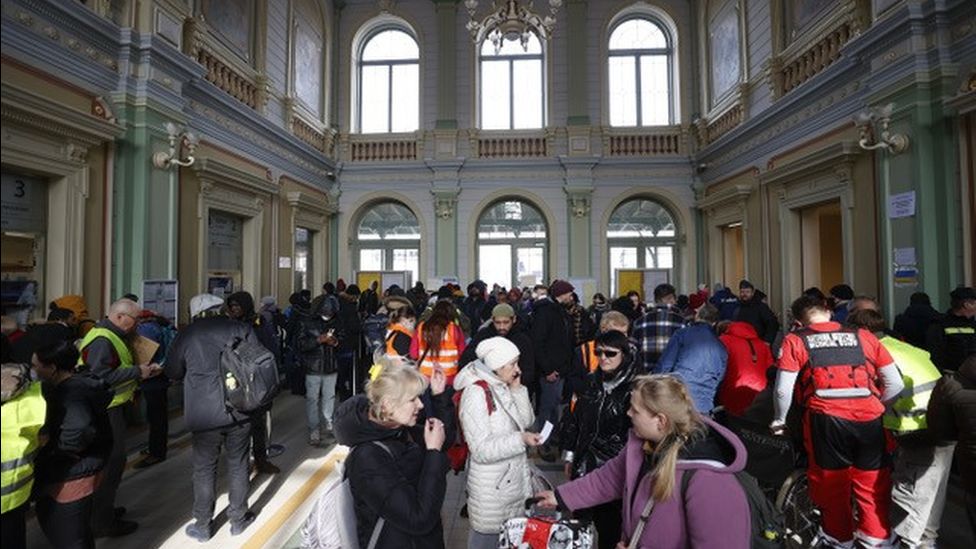Via a Google Meet, Stepan Veselovskyi, chief executive of Lviv IT Cluster, a tech community that unites nearly 200 companies in the city in western Ukraine, showed BBC News around his office – now full of key supplies such as medicines, bedding and food.
“Before the war we were a business organisation – but now we have transformed into a volunteer organisation,” he said.
“Everyone has become a volunteer.
“Anyone who has a car is taking supplies to other cities, at their own risk.”
Find shelter
Many technology companies were relocating to the west of the country, fleeing the Russian advance, Mr Veselovskyi told BBC News.
“It has saved many lives but also helps companies continue to sell their services,” he said.
“We can’t just sit and be afraid.
“And it is important for the Ukrainian economy if companies are able to deliver.”
Lviv IT Cluster is helping those who have left cities hit by bombing find shelter and supplies.
Mr Veselovskyi is also working with 200 cyber-security experts.
Just a few months ago, Dima Shvets was showing off his fun face-swap app, Reface, at Web Summit – now he is trying to counter disinformation
With a thriving technology scene, Ukraine was fast becoming a key hub in Eastern Europe and last year recorded its first “decacorns” – start-ups valued above $10bn (£7.5bn).
Now, many are focused on raising funds for the army.
Ukraine-based start-up Adwisely has launched a website showing how to donate to the Ukrainian army
Mobile app Diia is enabling Ukrainians to donate government grants for Covid-19 vaccinations to the military instead.
And millions of dollars have been donated.
Fighting back
Yelzaveta Semko, who also works for Truman, told BBC News internet connectivity remained pretty stable in most cities, with some providers setting up connections in shelters and underground bunkers.
But the Russians were trying to “misinform Ukrainians and spread fakes online”, including bogus messages, pretending to be from Ukraine’s security service about evacuation plans, and telling them Kyiv was surrounded.
It is frightening – but some Ukrainian businesses are fighting back.
In an attempt to combat the disinformation, Ukraine-based face-swapping app Reface now sends push notifications about the invasion to its 200 million Russian users, as well as watermarking all its videos with the hashtag #StandWithUkraine.
And Ukrainian security company Ajax Systems is developing an app to notify citizens about air-raid sirens.
Lots of people have left Ukraine for the safety of Poland
Meanwhile, Western technology companies have pledged to look after their employees in Ukraine.
Uber has paused operations in the country and offered its Kyiv-based employees and families relocation to other parts of Ukraine or abroad.
And rival Lyft has offered financial support to those wishing to temporarily leave.
But Andy Kurtzig, chief executive of JustAnswer, a website where people can quiz from doctors, lawyers, mechanics and other professionals, has no plans to evacuate his 87 Ukrainian employees.
Instead, he has promised to continue to pay them 50% of their salaries if they sign up to fight for Ukraine, as well as guaranteeing their employment when they return.
“Many other companies are pulling out of Ukraine and feeling Ukraine – but that’s exactly what [Russian President Vladimir] Putin wants,” Mr Kurtzig said.
“We’re not going to run away.”
Back-up power
For now, work is at a standstill, with the company giving employees five days’ paid leave.
And JustAnswer is working hard to keep its infrastructure stable and information safe by:
Other companies are helping evacuate employees, though.
Website-building company Wix said its employees based in Lithuania had driven to the Poland-Ukraine border to help their Ukrainian team members and families.
“These people have never met before,” chief executive Avishai Abrahami tweeted.
“I’m extremely moved and proud.”
Source: BBC


Comments